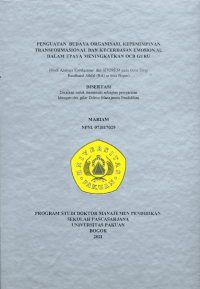Disertasi MP
Penguatan Budaya Organisasi, kepemimpinan Transformasional dan Kecerdasan Emosional dalam Upaya Meningkatkan OCB Guru: studi analisis korelasional dan SITOREM pada guru tetap Raudhatul Athfal (RA) Sekota Bogor
In achieving organizational success, it not only requires qualified and competitive people, but also requires resources who have extra role behaviors which are then referred to as Organizational Citizenship Behavior (DCB). The term organizational citizenship behavior is also used to identify employee behavior so that they can hold it as "good organizational citizens", where organizations will succeed well with members acting as "good organizational citizens". Thus a higher level of organizational citizenship behavior will result in higher levels of productivity, efficiency and effectiveness for organizations and help bring new resources into the organization by contributing to resource transformation, innovation, and adaptability. Therefore, the teacher's DCB behavior is needed to achieve the goals of learning. However, based on the initial survey, 41.11% of teachers were less than optimal in DCB behavior. Meanwhile, teachers who already had DCB behavior only reached 58.88%. Thus it can be said that teachers in Raudhatul Athfal (RA) who have the status of Permanent Teachers in Bogar City, still need to be improved regarding DCB behavior, so this condition is interesting to study. This study aims to make efforts to increase teacher DCB by examining the relationship of other variables, namely, organizational culture, transformational leadership and emotional intelligence. This research was conducted on 241 teachers in Raudhatul Athfal (RA) who were permanent teachers in Bogar City, West Java Province. This research design uses a correlational research flow which is analyzed using quantitative descriptive analysis equipped with SITDREM analysis. SITDREM analysis is carried out to derive recommendations from research results and determine the order of improvements that need to be made. The results showed that all independent variables had a positive and significant relationship with DCB. The first is organizational culture with OCB (ry I) of 0. 7 62 p 0. 0 I. Both transformational leadership with DCB (ry2) of 0.807 p
Ketersediaan
Informasi Detail
- Judul Seri
-
-
- No. Panggil
-
8/MAR/D-MP/2021
- Penerbit
- Bogor : SPs. Universitas Pakuan., 2021
- Deskripsi Fisik
-
xlix, 562 hlm. : ilus. ; 28 cm.
- Bahasa
-
Indonesia
- ISBN/ISSN
-
-
- Klasifikasi
-
8/MAR/D-MP/2021
- Tipe Isi
-
-
- Tipe Media
-
-
- Tipe Pembawa
-
-
- Edisi
-
-
- Subjek
- Info Detail Spesifik
-
-
- Pernyataan Tanggungjawab
-
Prof. Dr. H. Thamrin Abdullah, MM., M.Pd. dan Dr. Herfina, M.Pd.., M.Kom.
Versi lain/terkait
Tidak tersedia versi lain
Lampiran Berkas
Komentar
Anda harus masuk sebelum memberikan komentar

 Karya Umum
Karya Umum  Filsafat
Filsafat  Agama
Agama  Ilmu-ilmu Sosial
Ilmu-ilmu Sosial  Bahasa
Bahasa  Ilmu-ilmu Murni
Ilmu-ilmu Murni  Ilmu-ilmu Terapan
Ilmu-ilmu Terapan  Kesenian, Hiburan, dan Olahraga
Kesenian, Hiburan, dan Olahraga  Kesusastraan
Kesusastraan  Geografi dan Sejarah
Geografi dan Sejarah